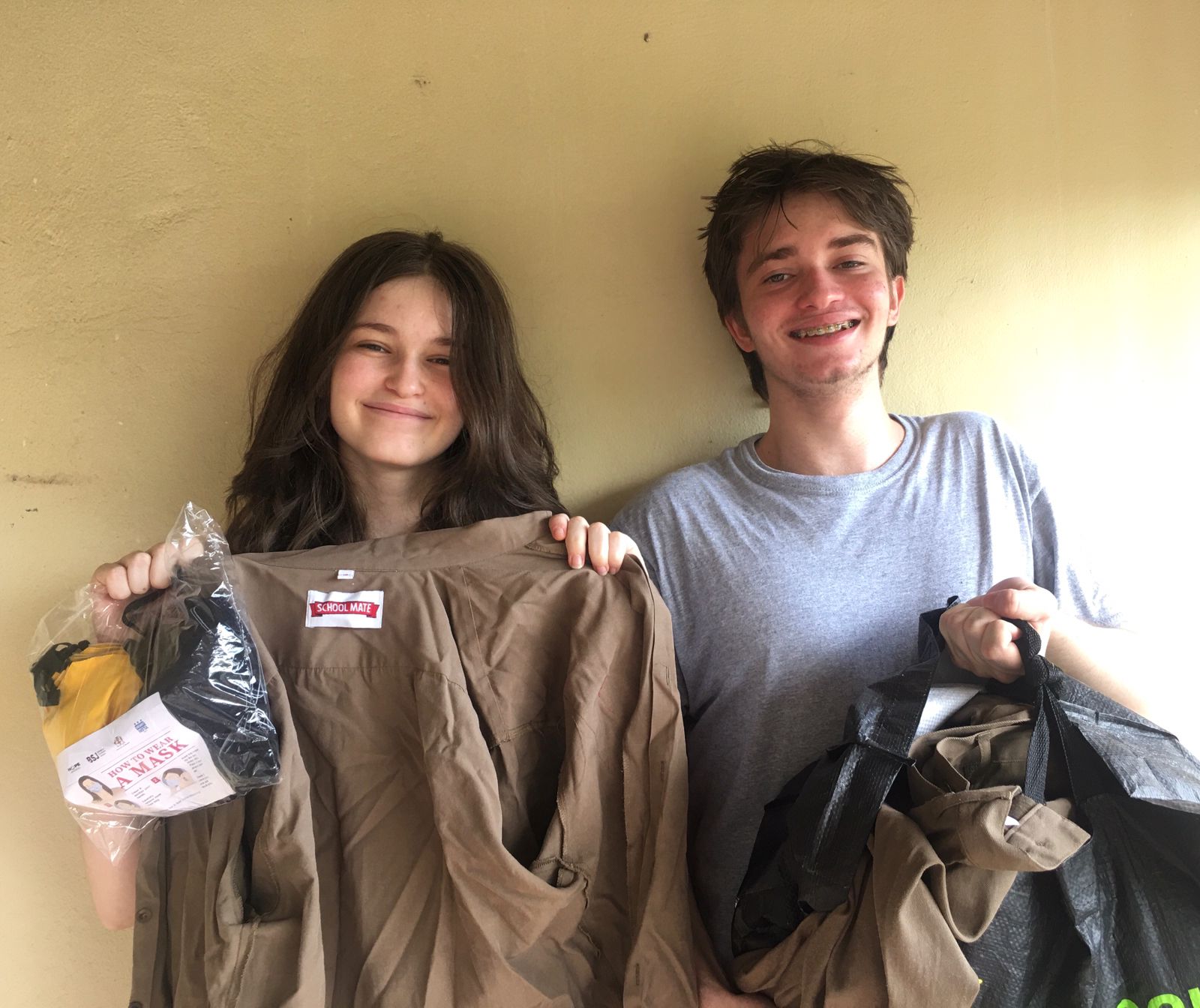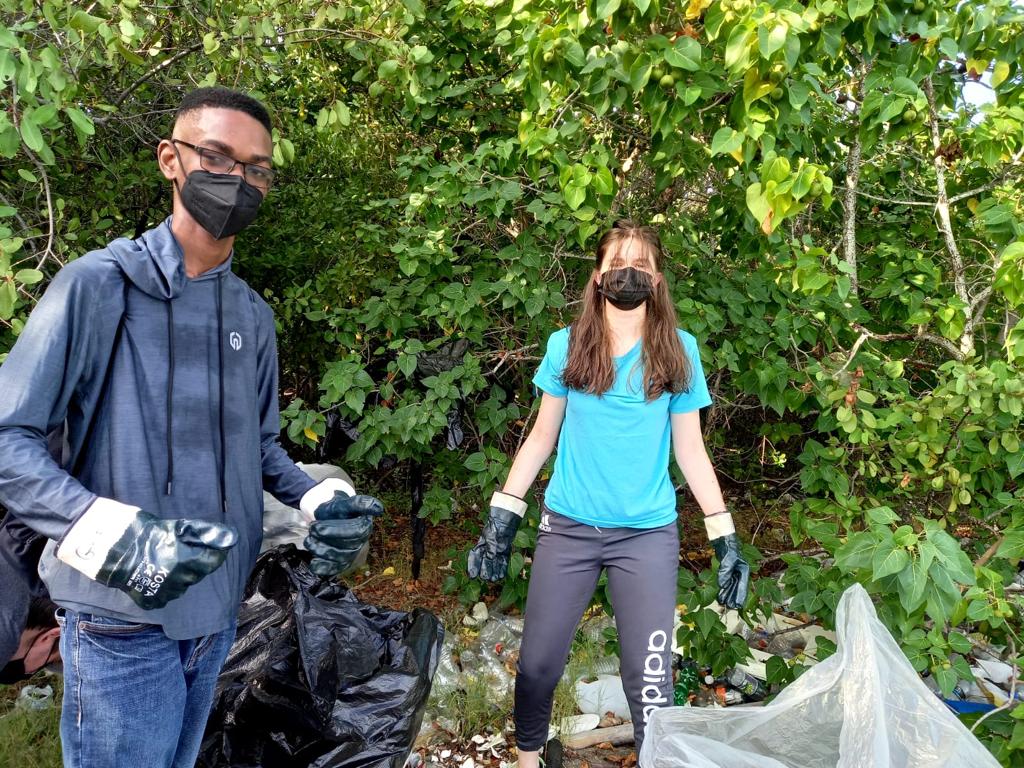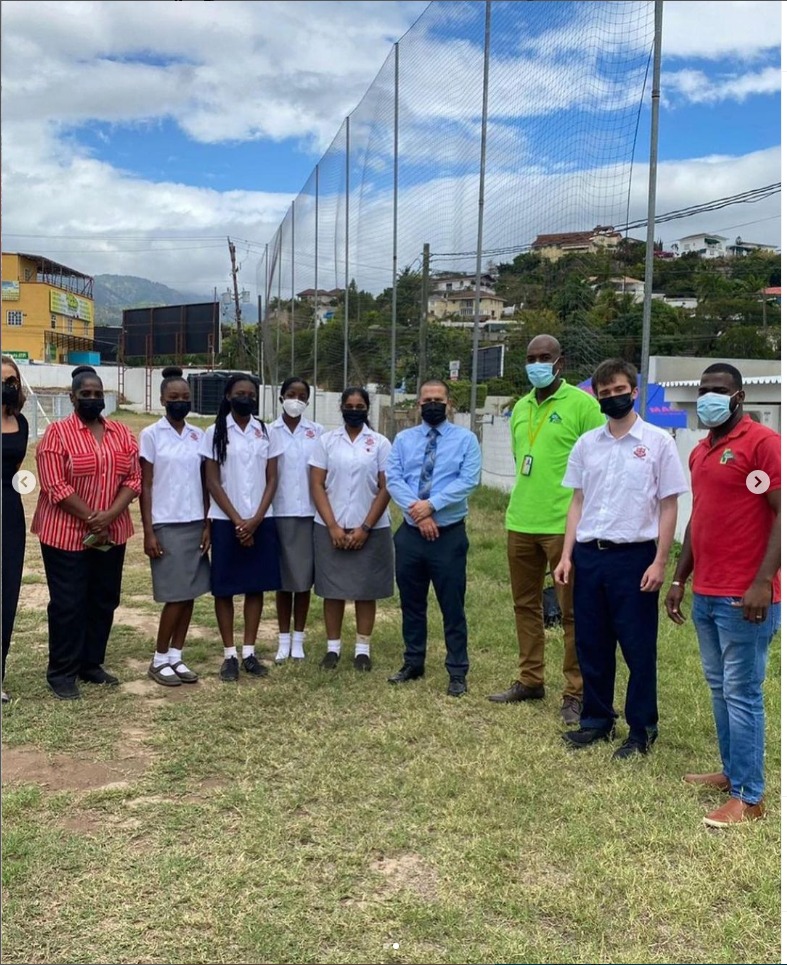‘For Small Island Developing States like Jamaica, [climate change is] a huge issue’
Originally published on Global Voices

Members of the school club ‘Green Generation,’ doing their part for the environment in Jamaica. Photos courtesy Green Generation, used with permission.
Campion College is a co-educational, independent high school in uptown Kingston. Founded in 1960 by Jesuits, it has an excellent reputation for academics and, like most high schools, offers several student clubs. One of these is the “Green Generation,” which has the slogan “Go green before the green goes.”
I spoke with the current club president, 17-year-old Rhys Greenland, as well as his sister Maria, and Jonathan Shaw — both 15, and both vice presidents — about their activities and goals. Even as they act locally, they are also thinking globally.
Emma Lewis (EL): How did “Green Generation” begin?
Maria Greenland (MG): A group of students started it in the 1990s. Those students included [current environment minister] Matthew Samuda and [opposition political candidate] Imani Duncan-Price. In fact, Matthew did some tree planting recently at the school, with the Forestry Department. Currently, we have around 50 members, aged 12 to 18, so we do include the whole school.
EL: What are the projects you have been most proud of?
Rhys Greenland (RG): You will find more information on our activities on our Instagram page. “Unicycle” is one. It is an initiative to recycle school uniforms. A few years ago, I had outgrown my khaki uniform – most Jamaican schools have khaki uniforms for the boys. I wondered how we could repurpose them. Many Jamaican students have just one set of uniforms, which they wash and rewash daily. With the help of Maria and Jordan Nakash [another club member] we began to collect and redistribute khaki uniforms – two million [Jamaican] dollars’ worth [about 13,000 United States dollars], so they don’t go to waste. It's all about waste.
We are looking to expand this programme. We have a new drive starting towards the end of the June and continuing through the summer. Our activities were scaled back for two years, during COVID-19 when school was closed. During COVID, however, we went into masks and school supplies. We got lots of corporate support, and […] made masks. Right now, masks are still mandatory in schools. We also started a “Cut and Toss” campaign, encouraging students to cut off the strings of their masks and recycle them, to protect wildlife such as seabirds that are harmed by masks with strings.
At the start of the year we create a calendar of activities, using some of the “special environment days” like Earth Day. We use social media a lot, to spread the word.

Siblings Maria and Rhys Greenland, showing off school uniforms from their school environmental club's recycling initiative. Photo courtesy Green Generation, used with permission.
EL: Tell me about your “Zero Waste Week.”
RG: This was a first for us. We had a different event or theme for each day of the week: Meatless Monday was to highlight that meat production, cattle farming, etc. contribute a lot to greenhouse gas emissions.
Tee Totes Tuesday involved the younger students. We worked with guidance counsellors and taught First Formers how to make tote bags out of old tee shirts, so they didn’t have to buy bags, and would use less plastic.
Wind Down Wednesday was about energy conservation. We wanted people to think about ways to reduce their electricity consumption.
Tree Planting Thursday was supported by the Forestry Department, which is spearheading the National Tree Planting Initiative to restore forests, fight climate change and create more green spaces for everyone.
Fast Fashion Friday included a clothing drive for donation to children’s homes. There is so much waste in the fashion industry.
We also held a scavenger hunt/quiz in the school courtyard, to raise awareness among fellow students. We try to get the messages out through announcements at school assembly, flyers and infographics, and through our IG page.

Young Jamaican environmentalists Jonathan Shaw and Maria Greenland, deep in trash. Photo courtesy Green Generation, used with permission.
EL: What level of support do you get from teachers, administrators and students?
Jonathan Shaw (JS): I think we have garnered a fair amount of support in the school. Lower schoolers also come out and show support. We had 60 participants at a recent online club meeting. Our numbers are fewer at the moment, because most of us are on study leave. We are gearing up again, as we only resumed face-to-face classes in February this year.
EL: What about your families, friends, parents?
MG: Our families are very supportive. Our parents are already on board. Some parents have even been guest speakers at club meetings: for example, one father talked about composting.
Caroline Mahfood at Grace Kennedy Foundation has been very helpful. We have done several beach clean-ups with them and we have had a very good turnout. We are planning to visit the Ocean Clean Up project in Kingston Harbour, which we are very excited about. They are collecting trash from three gullies that drain into the harbour, which is so polluted.

Green Generation members with Senator Matthew Samuda, the minister responsible for Environment and Climate Change at the Office of the Prime Minister after a tree-planting session at Campion College. Samuda (in the blue shirt and tie) is an alumnus of the school. Photo courtesy Green Generation, used with permission.
EL: Do you feel satisfied with the impact you have made?
RG: I have been the longest serving president in the club’s history. Some of our goals have been achieved. The Tee Totes is a mainstay of the First Form curriculum, so students learn about waste. The club has grown to a full classroom of students. At its peak it has been 100 members.
EL: What are the major issues that concern you in terms of the environment?
RG: Pollution! That is, solid waste pollution. When you see the mangroves in Kingston Harbour, it is shocking. The government needs to focus on a huge nationwide clean-up. Jamaica is an island. Many Jamaicans make a living along the coast. All of this affects fishermen directly.
MG: When you do beach cleanups, you see the size of the problem. After working for hours picking up garbage, you look around and see there is still so much left to clean up.
JS: I agree wholeheartedly. Green Generation will, we hope, encourage the next generation of young leaders — and policy makers. It is important that they become more environmentally conscious.
EL: What are your thoughts on climate change?
RG: It’s a huge threat. World leaders need to step up their game and stop making promises. We want action.
EL: How do you think your activities could be replicated in other schools that may not have the resources that your school has?
RG: You would be surprised to know that a lot of schools, especially the technical high schools, have environment clubs. Not far from us, Papine High School has a fully functional school farm; it is integrated into their curriculum. I would like to see more partnerships with other school environmental clubs. We could collaborate more for a larger impact. But I do believe things are changing for the better.
EL: Who inspires you?
RG: Sir David Attenborough because he is just amazing. He has done so much to make people of all ages across the world more aware of so many aspects of our environment — the good and the bad. Listening to him you can't help but be inspired because you learn something new every time, and you realize just how much of our natural world is under threat and that we all need to try to do what we can to help preserve it.
MG: Dr. Jane Goodall, because I think that the protection of our biodiversity and the education of others on it is extremely important. I admire her dedication and evident love for what she does.
JS: I think that, in general, the people who come out regularly in defense of environmental issues and face institutions who harm it inspire me, groups like Fridays for Future and Greenpeace.
EL: Are you optimistic about the future of the planet?
MG: When I look at the reality, I am not optimistic. But I don’t think we should just give up. I would like to believe something can be salvaged.
JS: There is so much more to be done and I am not entirely confident that we will see any improvement. Technology can give us some degree of hope, but I think it may not be enough. I don’t think it’s all doom and gloom, and awareness is growing. But it must be followed up with action.
RG: I can’t say I am very optimistic, but perhaps I am more so than a few years ago. At least world leaders are now acknowledging that climate change is happening.
Not enough is being done in climate action. We need a stronger environment ministry. Environmental issues are not even in the news! Yes, Jamaica had a “plastic ban,” but we need far more actions of that kind.
For Small Island Developing States (SIDS) like Jamaica, it’s a huge issue — for us, for our children and for our children’s children.
My grandchildren may not know what a fish tastes like!
Post a Comment